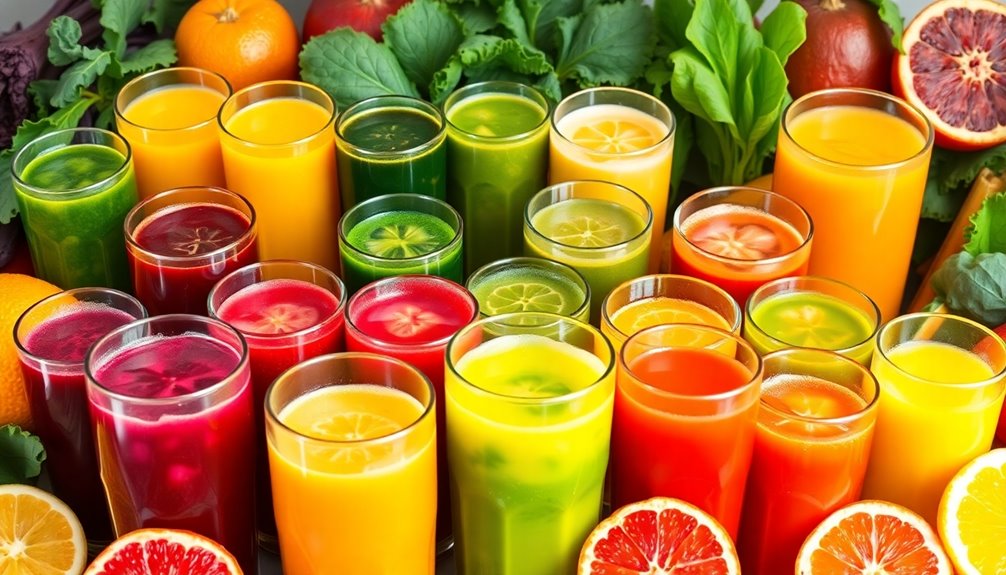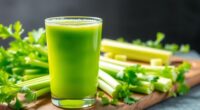Freshly squeezed juices are a fantastic way to boost your nutrient intake. For instance, cranberry juice is loaded with antioxidants, while tomato juice supports heart health. Beet juice enhances athletic performance, and orange juice offers a hefty dose of vitamin C. Each juice comes with its own benefits, packing vitamins, minerals, and natural sugars. Want to discover even more incredible health benefits and what other juices can do for you? There’s plenty more to explore! In addition to these delicious options, green juice made from kale and spinach is a powerhouse of vitamins A, K, and iron, making it an ideal choice for those looking to boost their overall vitality. If you’re curious about the specific contributions of each juice, be sure to look up the freshly squeezed juice nutrition facts to see how they align with your dietary goals. Whether you’re aiming to enhance your immune system or improve your digestion, there’s a juice out there for everyone! Additionally, incorporating a variety of freshly squeezed juices into your daily routine can help diversify your nutrient intake, ensuring you get a balanced assortment of vitamins and minerals. The benefits of freshly squeezed juices extend beyond just hydration; they can also aid in detoxification and provide a natural energy boost. As you explore the myriad flavors and health advantages each juice offers, you’ll likely find yourself feeling more vibrant and invigorated than ever before.
Key Takeaways
- Freshly squeezed juices retain maximum nutrients, providing essential vitamins like vitamin C and A crucial for immune and skin health.
- Cranberry juice is rich in antioxidants, supporting immune function and skin health, while also being beneficial for urinary tract health.
- Tomato juice offers a low-calorie option, packed with antioxidants that promote heart health and may reduce cancer risk.
- Beet juice is known for its nitrates, which enhance athletic performance and support blood pressure regulation.
- Celery juice is low in calories and rich in vitamin K, making it a great choice for reducing inflammation and oxidative stress.
Cranberry Juice
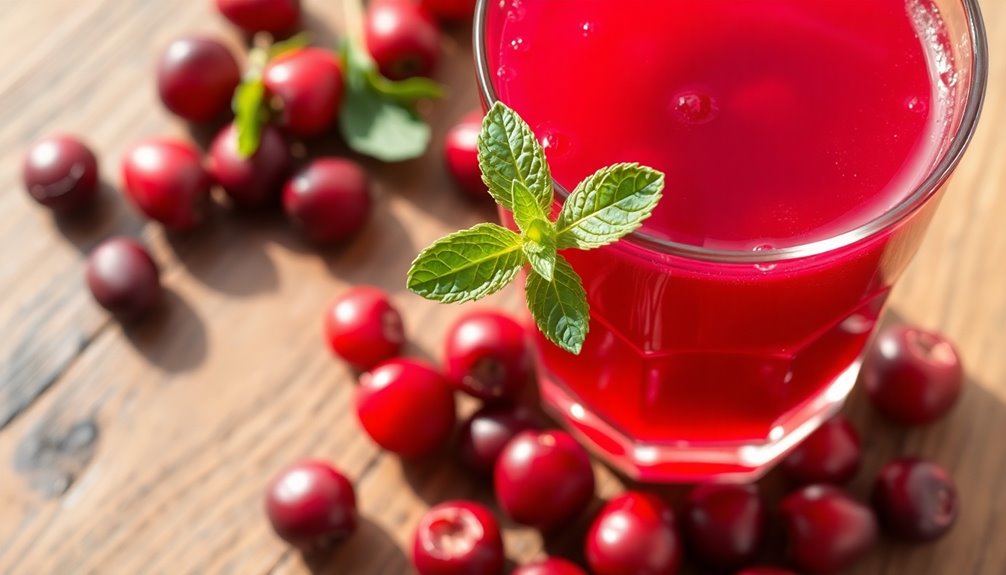
When you think of cranberry juice, you might picture its vibrant color and tart flavor, but it's also packed with nutrients that can benefit your health.
One cup of unsweetened cranberry juice contains about 116 calories, with 30.87 grams of carbohydrates and nearly 31 grams of sugars. It's low in protein and fat, offering only 0.99 grams of protein and 0.33 grams of fat.
You'll also find essential vitamins like 23.53 milligrams of vitamin C and 3.04 milligrams of vitamin E, which support your immune system and skin health. Additionally, cranberry juice contains 20.24 mg of calcium, which is important for bone health. Furthermore, its rich antioxidant content helps combat free radicals, promoting heart health and urinary tract function.
Just remember to choose unsweetened varieties to keep sugar intake in check.
Tomato Juice
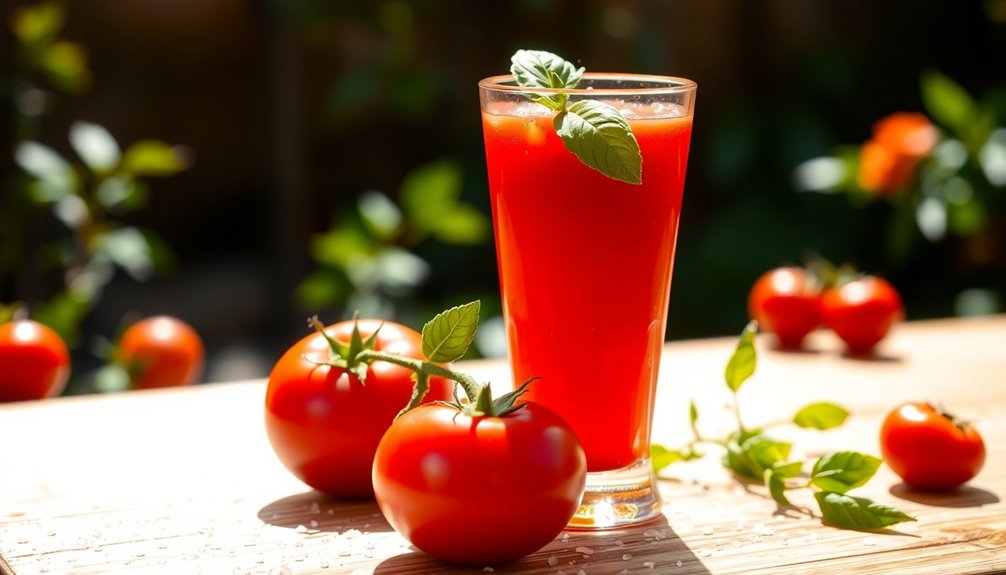
Tomato juice is a nutrient-rich beverage that offers a delightful way to boost your health.
With just 41 calories per cup, it's a low-calorie option packed with 2 grams of protein and fiber.
You'll get an impressive 74% of your daily vitamin C and 22% of vitamin A, supporting your immune system and vision. Additionally, its high antioxidant content helps protect your cells from free radical damage.
Plus, the potassium content, at 16% of the daily value, is great for heart health.
The powerful antioxidant lycopene helps reduce inflammation and may lower cancer risk.
Enjoy tomato juice in soups or sauces, or drink it straight for a refreshing nutrient boost.
Just remember, if you have digestive sensitivities, moderation is key!
Beet Juice
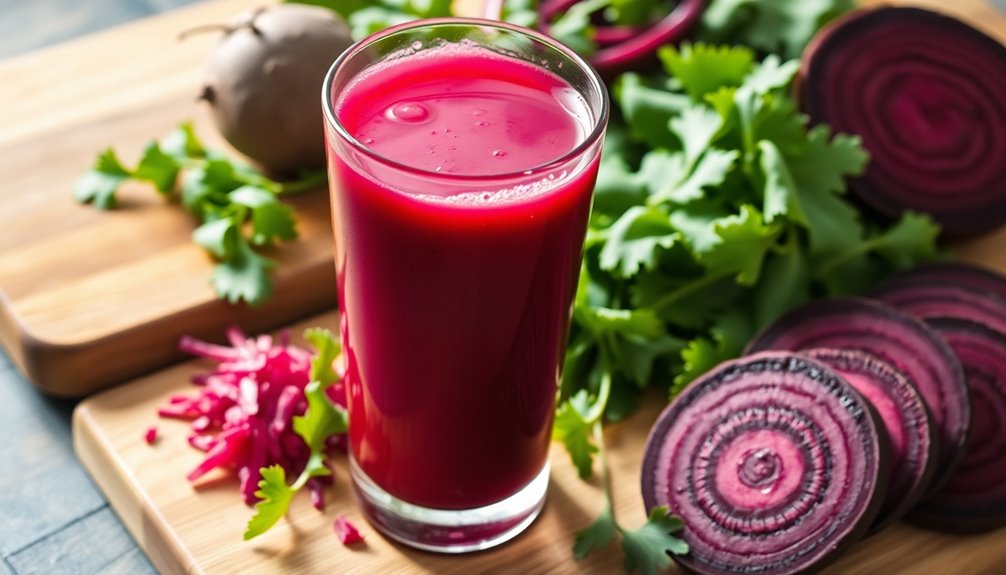
Beet juice stands out as another vibrant option for boosting your health, following the nutrient-rich profile of tomato juice. With about 62 calories per serving, it's low in fat and offers 1.79 grams of protein along with 14.7 grams of carbohydrates.
This juice is packed with essential minerals, including potassium, magnesium, and iron. One of its most impressive benefits is its ability to lower blood pressure due to its high nitrate content, which converts to nitric oxide in your body. Research has shown that consuming beet juice can result in a 5.2 mm Hg decrease in blood pressure. Additionally, beet juice can be part of an eco-friendly design as it contributes to overall wellness while being low in calories.
Furthermore, beet juice contains powerful antioxidants and may enhance athletic performance by improving oxygen usage. Incorporating beet juice into your diet can support liver health and even boost cognitive function, making it a fantastic choice for overall wellness.
Orange Juice

Orange juice offers a refreshing and nutritious way to boost your daily vitamin intake, especially with its impressive vitamin C content. Just one 8-ounce serving gives you 137% of the recommended daily intake, supporting your immune health and helping to fend off illnesses. It also contains potassium and folate, which are essential for overall well-being. While orange juice has more calories and sugar than whole oranges, its antioxidant properties, like hesperidin, provide significant health benefits. To maximize these advantages, opt for freshly squeezed juice, as it retains more nutrients compared to processed versions. Additionally, store-bought orange juice may have reduced vitamin C compared to home-squeezed varieties. Moreover, juices rich in vitamins can greatly enhance skin health and appearance. Keep in mind, moderation is key; excessive consumption might contribute to weight gain and impact fat burning. Enjoy it wisely for the best results!
Pomegranate Juice
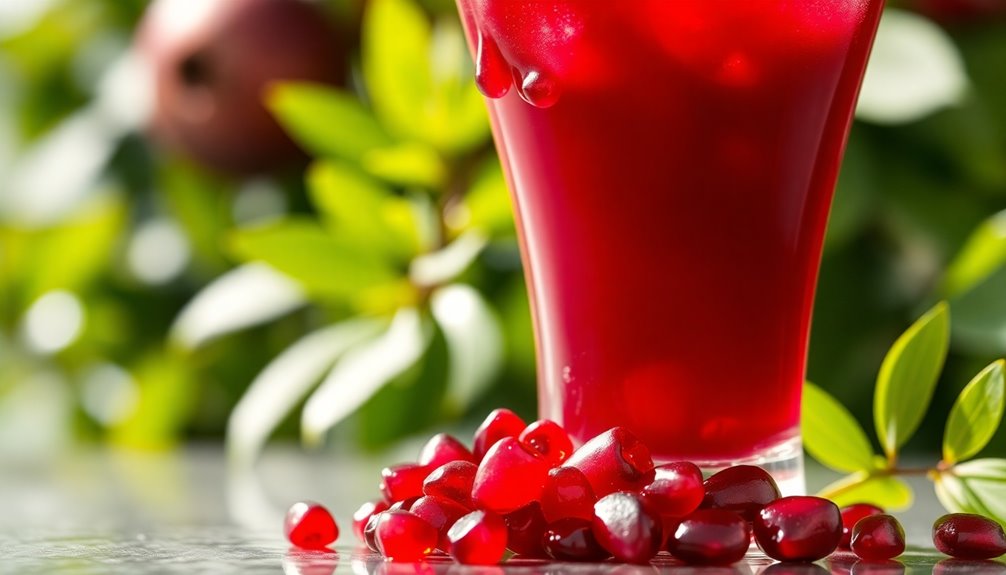
Pomegranate juice, known for its vibrant color and rich flavor, is a powerhouse of nutrients that can enhance your daily diet.
An 8-ounce serving packs about 135 calories and contains 1 gram of protein while being virtually fat-free. You'll find 34 grams of carbohydrates, including 30 grams of natural sugars.
This juice is a fantastic source of potassium, offering 536 milligrams per serving, plus it provides 10% of your daily copper needs. Rich in polyphenols, pomegranate juice boasts strong antioxidant activity, supporting heart health. Pomegranates contain high levels of polyphenols, which may help protect against heart diseases. Additionally, its high antioxidant content can contribute to overall health and wellness.
Although it loses some fiber and vitamin C during processing, its health benefits make it a popular choice worldwide.
Consider adding this delicious juice to your routine for a nutrient boost!
Apple Juice

Juices offer a variety of flavors and health benefits, and apple juice stands out as a popular choice.
With about 110 calories and 0 grams of fat per 8 oz serving, it's crucial to monitor your intake if you're watching sugar levels. While it's fat-free and low in protein, apple juice shines with its vitamin C content, providing up to 80% DV Vitamin C of your daily value. Moreover, the antioxidants in apple juice can help reduce airborne pollutants that may affect overall wellness.
The potassium in apple juice supports heart health and hydration, while antioxidants contribute to overall wellness.
When selecting apple juice, opt for 100% pure varieties to avoid added sugars. Remember, moderation is key due to the high sugar content, but enjoying fresh or cloudy juice can enhance your nutrient intake.
Pineapple Juice

When you think of tropical flavors, pineapple juice often comes to mind as a refreshing option packed with nutrients. One cup contains about 132 calories, with less than 1 gram of protein and fat. You'll find around 32-33 grams of carbohydrates, including approximately 25 grams of sugars. Pineapple juice is a powerhouse of vitamins and minerals, providing 100% of your daily Vitamin C needs and over 55% of manganese. It also offers copper, Vitamin B6, and potassium, along with 0.5 grams of fiber which can aid in digestion.
Its antioxidants and bromelain support immunity, bone health, and even wound healing. Plus, the hydroxycinnamic acids contribute to its overall health benefits.
Enjoying pineapple juice can be a delicious way to boost your nutrient intake!
Grape Juice
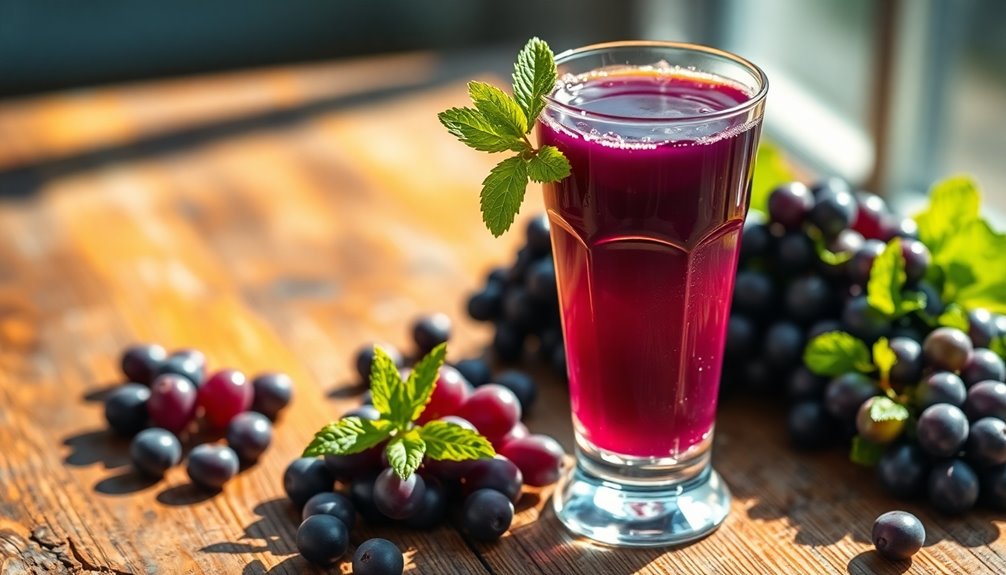
Grape juice is a delightful and nutritious choice that offers a burst of flavor along with numerous health benefits. With about 152 calories per cup, it provides a significant dose of vitamin C—70% of your daily value—alongside manganese for bone health. Its rich blend of antioxidants, including flavonoids and resveratrol, helps reduce inflammation and supports heart health. High in natural sugars, grape juice can be enjoyed for a quick energy boost or hydration, but it's essential to be mindful of your intake. In addition, it may also promote overall health by delivering essential vitamins and minerals found in various juices. Opt for homemade juice to control added sugars, or try different grape varieties for unique flavors. Just remember to keep your serving to one cup daily to maintain balance in your diet. Incorporate it into smoothies or use it as a natural sweetener to enhance your meals!
Carrot Juice
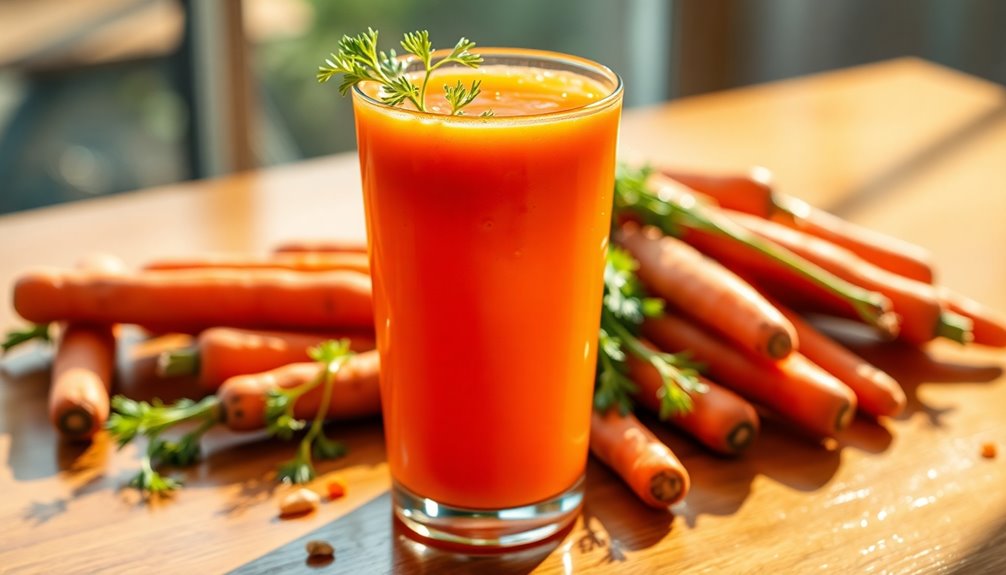
Carrot juice packs a powerful punch of nutrients, making it an excellent addition to your diet. With just 94 calories per cup, it's primarily composed of carbs, providing a quick energy source. You'll benefit from a whopping 251% of your daily value of vitamin A, crucial for eye health and reducing age-related diseases. It also boosts your immunity thanks to its rich nutrient profile. Antioxidants like beta carotene and lutein help improve your skin health as well. Additionally, you can enhance your juice with chia seeds, which are rich in omega-3 fatty acids and provide a complete protein source. For the freshest taste and maximum nutrients, try juicing organic carrots. Consuming carrot juice on an empty stomach allows for optimal absorption of its nutrients. You can mix it with fruits like oranges or apples for added flavor. Don't forget to experiment with spices like ginger or turmeric for extra health benefits!
Watermelon Juice
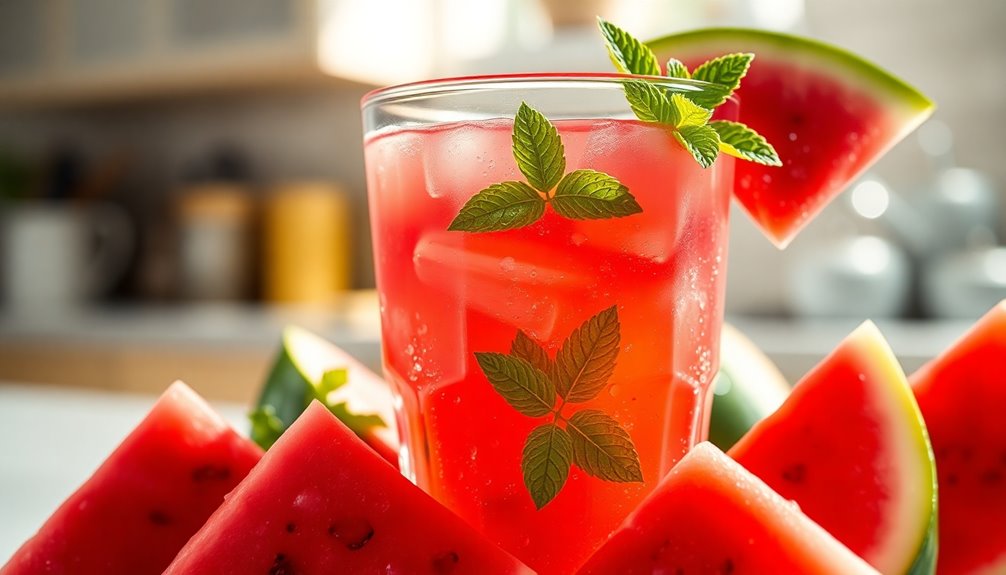
Watermelon Juice
Although you might think of watermelon as just a refreshing summer snack, its juice offers a wealth of nutrients that can enhance your diet.
With about 72 calories in an 8-ounce serving, watermelon juice is low in calories yet high in hydration. It packs 18.1g of carbohydrates, along with 1.5g of protein and minimal fat.
Rich in vitamin C, A, and B6, it supports your immune system and overall health. Plus, it's a great source of potassium, magnesium, and calcium, which benefit heart health and hydration. Additionally, watermelon juice contains more lycopene than a tomato, making it a powerful ally in fighting inflammation.
The antioxidants like lycopene help fight inflammation, while the natural energy boost from its nutrients makes it an excellent choice for a revitalizing drink. Enjoy it fresh or with a splash of lemon!
Mango Juice
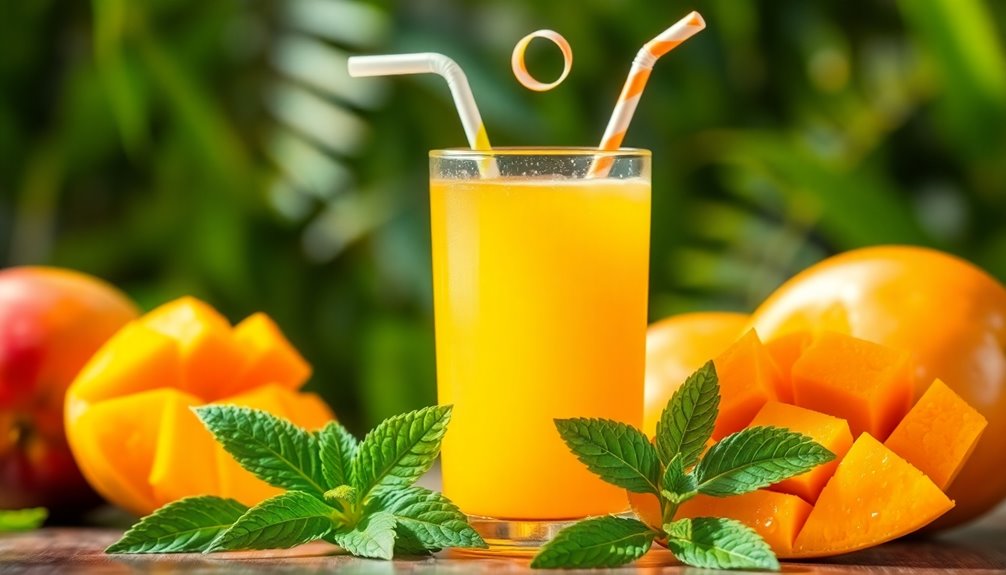
With about 190 calories per cup, it's primarily composed of carbohydrates, boasting 34g of sugar and 3g of fiber. This juice provides a significant potassium boost, offering 14% of your daily value in just one cup. Additionally, it is important to note that freshly squeezed juices, like mango juice, are often preferred for their higher nutrient retention compared to packaged options. While it lacks the vitamin C and fiber found in whole mangoes, its antioxidant properties still contribute to your overall health. Freshly squeezed mango juice retains more nutrients than packaged options, making it a great choice. Whole fruits provide fiber, which aids in slower sugar absorption compared to juice, enhancing digestive health.
You can even mix it with other juices, like orange, for a delightful twist. Enjoy this refreshing drink and hydrate your body!
Celery Juice
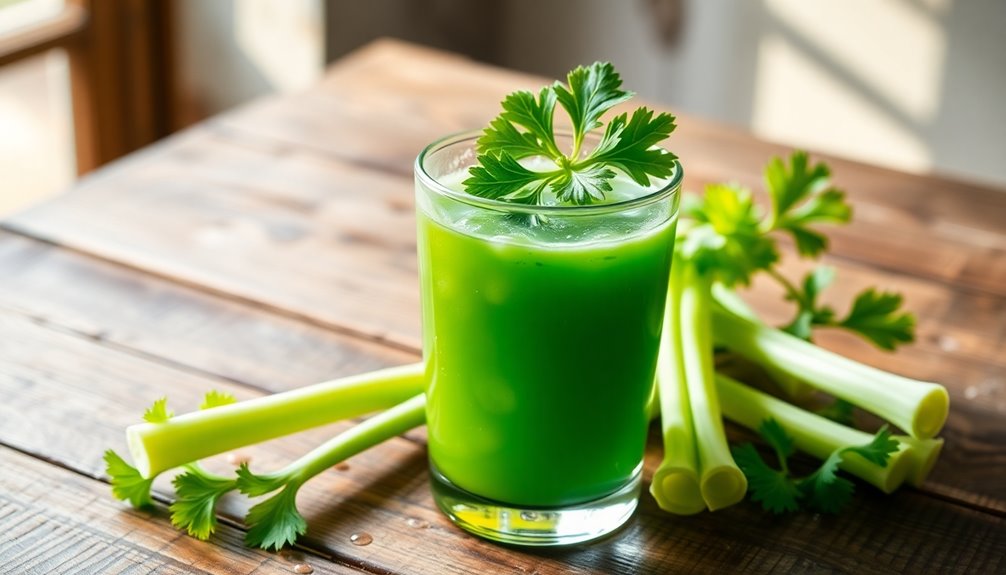
After enjoying the sweet and vibrant flavor of mango juice, you might want to explore the refreshing and revitalizing qualities of celery juice.
This low-calorie drink packs only about 33 calories per cup, while providing 3.8 to 4 grams of fiber. It's rich in vitamin K, offering 57% of your daily value, plus potassium and sodium for electrolyte balance. Additionally, celery juice is high in sodium, which can help maintain fluid balance in the body. Whole fruits are also beneficial for hydration and nutrient intake.
With natural sugars around 3 grams, it's a lightly sweet option. The antioxidants in celery juice help combat oxidative stress and may reduce inflammation, supporting your immune system.
Plus, its high water content keeps you hydrated. Whether you enjoy it solo or mixed with cucumbers, celery juice is a nutrient powerhouse that can boost your health effortlessly.
Spinach Juice
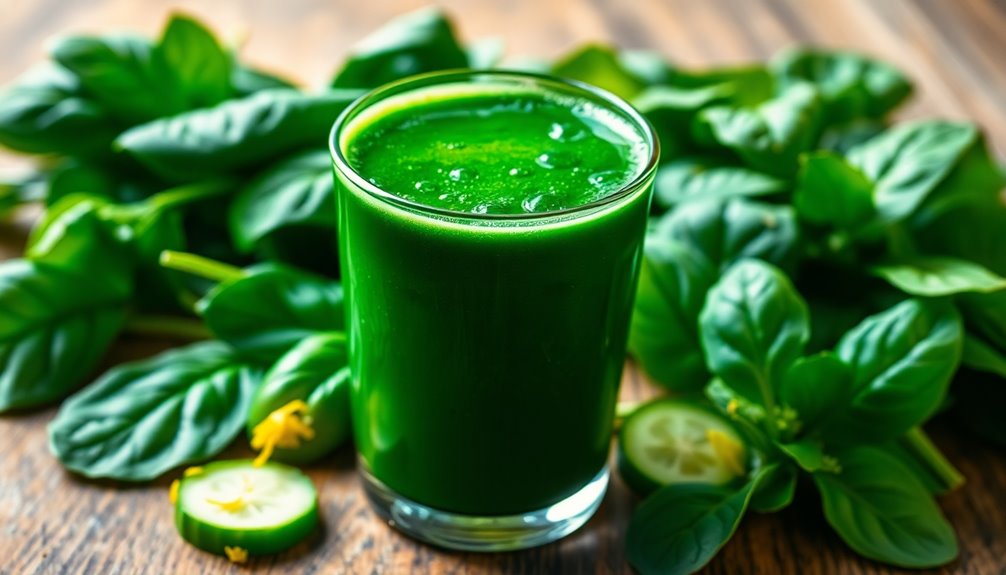
Spinach juice offers a refreshing and nutrient-dense option, containing just 8 to 28 calories per serving.
With minimal fat and protein, it packs a healthy carbohydrate range of 1.4g to 6.5g. You'll enjoy its low sugar content while benefiting from its high fiber, which aids digestion.
Rich in vitamin A and C, spinach juice supports immune function, healthy skin, and hair. Plus, it's a great source of potassium which helps regulate blood pressure, providing approximately 558mg per serving.
The antioxidants lutein and zeaxanthin enhance eye health, protecting against age-related issues.
You can easily integrate spinach juice into your diet, often blended with citrus or apple for added flavor. It's a delicious way to boost your nutrient intake without excess calories.
Ginger Juice

Ginger juice is a powerful addition to your diet, offering a myriad of health benefits packed into a small serving. With just 20 calories and 5 grams of carbohydrates per 30 mL, it's a low-calorie option that won't derail your diet. This sodium-free juice can calm digestive discomfort and reduce nausea. Its anti-inflammatory properties help alleviate muscle soreness and menstrual cramps while potentially lowering blood pressure. Additionally, it provides 417mg of potassium per serving, contributing to your daily potassium intake. You can easily make ginger juice at home or find it blended with other flavors in stores. Just remember, if you're on blood thinners or pregnant, it's best to consult a healthcare professional before adding it to your routine. Enjoy it in smoothies, dressings, or as a refreshing beverage! Moreover, ginger juice is often touted for its ability to combat oxidative stress, making it a great complement to other antioxidant-rich foods.
Frequently Asked Questions
Are There Any Side Effects of Drinking Too Much Juice?
Yes, drinking too much juice can lead to several side effects.
You might experience weight gain due to excess calories and sugar that can spike your blood sugar levels. This could increase your risk of insulin resistance and related diseases like diabetes.
Additionally, you may miss out on essential nutrients found in whole fruits, such as fiber, which is crucial for digestion.
Lastly, high sugar content can also harm your dental health.
How Can I Reduce the Sugar Content in Juices?
To reduce the sugar content in juices, you can try a few methods.
Consider using vacuum evaporation or membrane filtration to concentrate juices while lowering sugar.
Alternatively, add more vegetables to your homemade juices for a better nutrient balance.
You might also look for juices that utilize sugar-reducing technologies or even dilute your juice with water.
Always opt for 100% juices without added sugars to avoid unnecessary calories.
Moderation's key!
What Is the Best Time to Drink Juice for Health Benefits?
Imagine starting your day with a burst of sunshine in a glass.
The best time to drink juice is in the morning on an empty stomach. This maximizes nutrient absorption, giving your body a refreshing energy boost.
Sipping it slowly enhances digestion, while the vitamins work their magic.
If you feel an afternoon slump, a juice break can reignite your vitality.
Just remember to enjoy it mindfully to reap all the health benefits!
Can I Mix Different Juices for Enhanced Nutrients?
Absolutely, you can mix different juices for enhanced nutrients!
Combining juices from various fruits and vegetables boosts vitamins, minerals, and antioxidants, giving your body a broader range of health benefits.
For example, mixing citrus with leafy greens can enhance immune function, while adding berries provides powerful antioxidants.
Just aim for a balanced blend, and remember to enjoy them in moderation to keep sugar levels in check.
Your body will thank you!
How Long Do Freshly Squeezed Juices Last in the Fridge?
Freshly squeezed juices can last up to 72 hours in the fridge, but for the best flavor and nutrients, you should consume them within 24 to 48 hours.
Make sure to store your juice in airtight glass containers to minimize nutrient loss and keep it at a temperature between 35-40°F (1.6-4.4°C).
Always check for signs of spoilage before drinking, as bacterial growth can increase after a few days.
Conclusion
Incorporating freshly squeezed juices into your diet can transform your health and boost your nutrient intake. For instance, just one cup of beet juice contains about 220% of your daily recommended intake of vitamin C, showcasing its potency. Whether you're sipping on vibrant cranberry juice or refreshing celery juice, each option offers unique benefits that can enhance your well-being. So, why not grab your juicer and start experimenting with these delicious elixirs? Your body will thank you!
Cindy thoroughly researches juicing trends, techniques, and recipes to provide readers with practical advice and inspiration. Her writing style is accessible, engaging, and designed to make complex concepts easy to understand. Cindy’s dedication to promoting the advantages of juicing shines through her work, empowering readers to make positive changes in their lives through the simple act of juicing.

